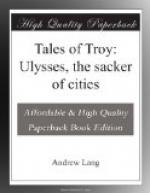Then stood up on one side Aias and on the other Ulysses, for these two had rescued the body, and neither thought himself a worse warrior than the other. Both were the bravest of the brave, and if Aias was the taller and stronger, and upheld the fight at the ships on the day of the valour of Hector; Ulysses had alone withstood the Trojans, and refused to retreat even when wounded, and his courage and cunning had won for the Greeks the Luck of Troy. Therefore old Nestor arose and said: “This is a luckless day, when the best of the Greeks are rivals for such a prize. He who is not the winner will be heavy at heart, and will not stand firm by us in battle, as of old, and hence will come great loss to the Greeks. Who can be a just judge in this question, for some men will love Aias better, and some will prefer Ulysses, and thus will arise disputes among ourselves. Lo! have we not here among us many Trojan prisoners, waiting till their friends pay their ransom in cattle and gold and bronze and iron? These hate all the Greeks alike, and will favour neither Aias nor Ulysses. Let them be the judges, and decide who is the best of the Greeks, and the man who has done most harm to the Trojans.”
Agamemnon said that Nestor had spoken wisely. The Trojans were then made to sit as judges in the midst of the Assembly, and Aias and Ulysses spoke, and told the stories of their own great deeds, of which we have heard already, but Aias spoke roughly and discourteously, calling Ulysses a coward and a weakling. “Perhaps the Trojans know,” said Ulysses quietly, “whether they think that I deserve what Aias has said about me, that I am a coward; and perhaps Aias may remember that he did not find me so weak when we wrestled for a prize at the funeral of Patroclus.”
Then the Trojans all with one voice said that Ulysses was the best man among the Greeks, and the most feared by them, both for his courage and his skill in stratagems of war. On this, the blood of Aias flew into his face, and he stood silent and unmoving, and could not speak a word, till his friends came round him and led him away to his hut, and there he sat down and would not eat or drink, and the night fell.
Long he sat, musing in his mind, and then rose and put on all his armour, and seized a sword that Hector had given him one day when they two fought in a gentle passage of arms, and took courteous farewell of each other, and Aias had given Hector a broad sword-belt, wrought with gold. This sword, Hector’s gift, Aias took, and went towards the hut of Ulysses, meaning to carve him limb from limb, for madness had come upon him in his great grief. Rushing through the night to slay Ulysses he fell upon the flock of sheep that the Greeks kept for their meat. And up and down among them he went, smiting blindly till the dawn came, and, lo! his senses returned to him, and he saw that he had not smitten Ulysses, but stood in a pool of blood among the sheep that he had slain. He could not endure the disgrace of his madness, and he fixed the sword, Hector’s gift, with its hilt firmly in the ground, and went back a little way, and ran and fell upon the sword, which pierced his heart, and so died the great Aias, choosing death before a dishonoured life.




